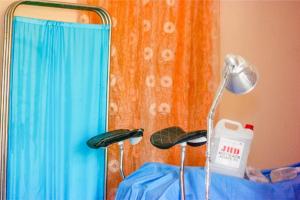WHO partners Anambra State to launch cervical cancer screening and treatment project
Awka, 11 November, 2022 - In line with the theme of the 2022 International Cancer Week, Anambra State, in collaboration with the World Health Organization (WHO), recently launched an innovative cervical cancer screening and treatment project, targeting women of reproductive age across the state.
International Cancer Week, is marked every year and the theme for this year is Bridging the cancer care Gap: Improving Diagnosis and Multidisciplinary Management. In Nigeria, the week was marked from 1 to 4 November 2022.
Delivering the keynote address during the launch, the wife of Anambra State Governor, Dr Nonye Soludo, called on women in the state to spread the word about the programme and participate in cervical cancer screening.
She said, “There is a need for mass education of women on the importance of cervical cancer screening and early diagnosis to enable early treatment. We are grateful for WHO’s support as they are a worthy and dependable health development partner in our quest for prevention, screening and early treatment of cervical cancer among our girls and women, especially for women in rural areas.”
Supporting the project
The donations of medical equipment and other supplies for cervical cancer screening, being handed over to the government today by WHO is a shining testament of WHO’s unwavering commitment to this partnership”, she said.
The cervical cancer screening and treatment project is part of WHO’s initiative in supporting Nigeria to reduce the burden of cervical cancer in the country. In its support to the state, WHO has committed funds and donated medical equipment to four hospitals (1 tertiary hospital, and three general hospitals), and seven primary health care centres (PHCs) that will serve as focal sites for the cervical cancer elimination project.
Some of the medical equipment and supplies donated by WHO include examination couches (4), angle poise lamps (20), Cusco’s speculum (50), instrument trolley with wheels (15), Disposable aprons (50), a kidney dish (50), mackintosh standard size (20), swab sticks (100 packets), punch biopsy forceps (10), 90% ethanol solution 150litres etc.
WHO plans to train 100 health workers who will provide cervical cancer screening services in the focal health facilities as well as provide ongoing technical support to ensure the project achieves its goal.
Highlighting the importance of the initiative in Anambra state, the WHO Southeast Zonal Coordinator, Dr Igboekwu Chukwumuanya, said cervical cancer screening is crucial to significantly reduce mortality from the disease because early diagnosis of the pre-cancerous lesions can be cured and well managed.
He commended the Anambra State government for being on track to meeting the 90-70-90 cervical cancer elimination targets set by the World Health Assembly. The 90-70-90 strategy implies that 90% of girls are fully vaccinated with the HPV vaccine by the age of 15; 70% of women screened using a high-performance test by the age of 35, and again by the age of 45; and 90% of women with pre-cancer treated and 90% of women with invasive cancer managed.
Aside from Anambra state, WHO, with funding from Susan Thompson Buffet Foundation (STBF), is providing catalytic support to Ondo, Kebbi, Ekiti, and Niger, for cervical cancer screening and treatment.
Global call for action
Cervical cancer is the fourth most common cancer among women globally, with an estimated 604 000 new cases and 342 000 deaths in 2020. Nigeria records an estimated 12, 075 cervical cancer cases and 7,968 deaths annually.
In 2020, the World Health Assembly adopted the Global Strategy for cervical cancer elimination.
Marking the week in Abuja, the WHO Country Representative, Dr Walter Kazadi Mulombo in his speech reminded the government of WHO’s Global Call for Action to eliminate cervical cancer by 2030.
“As WHO we are committed to supporting the country implement priority activities towards cancer prevention and control, he said.
According to WHO, the primary cause of cervical cancer is persistent or chronic infection with one or more of the “high-risk” types of Human Papilloma Virus (HPV) which generally occur in adolescence after the first acts of sexual intercourse. Primary cancer prevention includes adopting a healthy diet, exercising, not using tobacco, and getting vaccinated against HPV (cervical cancer) and hepatitis B if you belong to a group for which vaccination is recommended while the secondary level of prevention includes early diagnosis and prompt treatment.
Techncal Contacts:
Dr Igboekwu Chukwumuanya; Email: igboekwuc [at] who.int (igboekwuc[at]who[dot]int)
Dr Adamu Abdulnasir; Email: adamuab [at] who.int (adamuab[at]who[dot]int)





